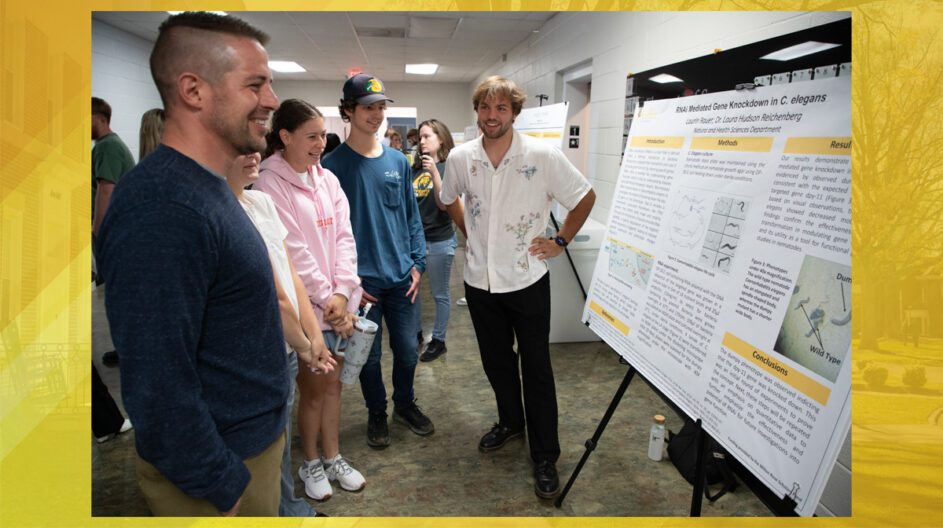
20th Annual Symposium Highlights Student Research
Pfeiffer University’s Department of Natural and Health Sciences, in partnership with the Milton Rose Research Fellows Program and the Gustavus and Louise Pfeiffer Research Foundation, hosted the 20th annual George Pfeiffer Research Symposium on Friday, April 12th. Each year, the symposium, named in honor of George R. Pfeiffer – former University trustee and past president of the Pfeiffer Foundation – provides an opportunity for Milton Rose Fellows and other student researchers to present their findings, experiences, and achievements to the campus community.
“Students who are accepted into the Milton Rose Research Fellows Program begin working as freshmen with a faculty mentor to eventually establish a research direction with the goal of completing a capstone project that is a unique and contributing effort to ongoing research areas,” said Dr. Laura Reichenberg, Associate Professor of Biology and symposium coordinator. “The symposium allows these students to present what they have been working on over the course of their Pfeiffer career, but it isn’t limited to Milton Rose Fellows, and we are so glad to have other student researchers presenting as well.”
The Milton Rose Research Fellows Program honors Milton C. Rose, a founding trustee of the Gustavus and Louise Pfeiffer Research Foundation and a former University trustee.
Reichenberg notes that students who participate in undergraduate research earn higher grades, are more likely to graduate, and are better equipped for graduate school or careers, according to multiple studies. She calls the George Pfeiffer Research Symposium one of the most rewarding parts of her job. “I love to watch as my students’ confidence grows. The more research they conduct, the more confident they are in their scientific abilities,” she said. “The symposium really showcases the range of cross-disciplinary and interdisciplinary student learning that is happening here. That foundation has jump-started the careers of many outstanding scientists, and it is an amazing thing to experience.”
This year’s symposium included several students who are pursuing Pfeiffer’s Cancer Rehab minor. The group presented their research titled “Evaluating Cancer Rehabilitation Programming.” Their work focused on the benefit of exercise for cancer patients, and they found positive associations between exercises focused on body-based movements and a lower symptom severity score for cancer patients.
“We appreciated being able to help real people and watch as those people gained confidence after a life-altering experience with cancer,” said Josh Turner ’24. “Each member of our group has a personal story about how cancer has affected their lives and the lives of their loved ones. We are passionate about this research, even more so after seeing the tangible differences we have made in the lives of our patients.”
Natasha Feaster ’25 spent the semester researching kudzu and its potential to create an eco-friendly biofuel – a type of fuel that is made from plant-based materials and/or organic waste. Feaster proposes that kudzu is an innovative approach to addressing the dual challenges of energy sustainability and invasive species management.
Madeline Chadbourne ’25 has been working to research and apply forensic microbial techniques to monitor the decomposition process in chickens, to analyze evidence of inadvertent microorganism/toxin release.
“My faculty mentor, Dr. McCallum, has played a huge role in my education and research. He is on the cutting edge of scientific research; his expertise has been invaluable to my studies and growth as a scientist,” said Chadbourne.
In total, 16 student presenters took part in this year’s symposium. Research topics included forensic microbiology, the role of occupational therapy in special education, and the role of sleep habits in athletic performance.
“For 20 years, the George Pfeiffer Research Symposium has honored the memory of George Pfeiffer, by providing an opportunity for undergraduate science majors to explore topics of personal and scientific interest. This experience promotes scientific research, fosters collaboration, and prepares students for presentations at both regional and national scientific meetings. The symposium really celebrates students’ accomplishments, and I enjoy seeing them develop a broader understanding of the significance of their research to the scientific community,” said Dr. Mark McCallum, Director of Academic Initiatives and Professor of Biology.
In addition to student presentations, the 2024 symposium featured keynote speaker Daniel Stovall, Assistant Professor of Biology at Winthrop University, who presented his research on the role of polycomb protein, RYBP, in Glioblastoma. His research, conducted in collaboration with his undergraduate students, found that RYBP could potentially be used as a biomarker to help predict which cancer patients would be responsive to certain types of treatments.